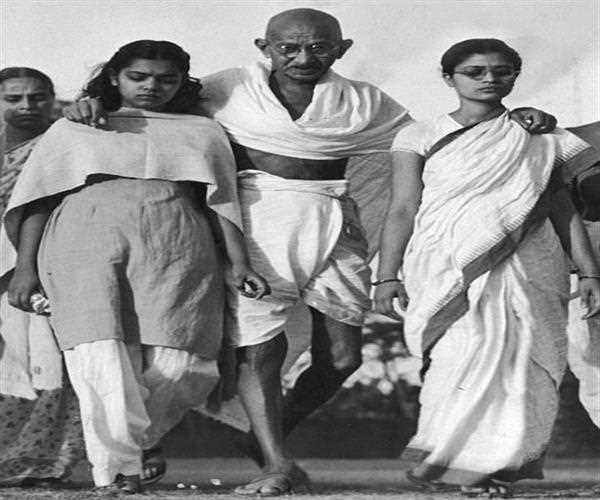
25-Jun-2024 , Updated on 8/19/2025 11:57:22 AM
Gandhi’s Experiments with Celibacy (ब्रह्मचर्य के प्रयोग)
Following celibacy isn't a crime; it's seen as a form of discipline. Yet, even after seven decades, Gandhi's celibacy experiments continue to ignite debate. Modern society still struggles to comprehend Gandhi's actions, particularly his choice to involve his 19-year-old granddaughter-like figure, Manu, in these experiments. These questions persist because of the ethical implications surrounding celibacy.
During the late 1940s, amidst efforts to quell communal violence, Gandhi and Manu were inseparable. He publicly admitted to sharing a bed with her, where they slept nude, citing it as part of his celibacy practice. Gandhi's letters to Lal Nayar in December 1945, part of the Complete Gandhi Collection, detail these intimate arrangements without hesitation. Manu, young and diligent in her diary-keeping, faithfully recorded these occurrences, now preserved in the National Archives of India.
In her diary entry on December 31, 1945, Manu described Gandhi's physical affection towards her while they shared a bed with Sushilaben. Despite these closenesses, Gandhi maintained his innocence regarding any sexual desires towards her. The revelations shocked Gandhi's contemporaries and sparked widespread condemnation. Criticism escalated further after Gandhi publicly acknowledged their arrangement in Noakhali, where he proclaimed their shared bed as part of his sacred sacrifice for celibacy.
The fallout was severe. Leaders within Congress, including Sardar Patel, expressed dismay over Gandhi's actions. Patel, in a letter dated January 25, 1947, expressed profound concern over the controversy Gandhi had stirred, emphasizing that it could potentially undermine public respect for Gandhi's moral authority. Amidst the tumult, Manu struggled with her role in Gandhi's experiments, facing public scrutiny and derogatory criticism, which deeply affected her.
Even after Gandhi's assassination in 1948, Manu's life took a tragic turn. Sent to live with her family in Mahuva, Gujarat, editors of the Hindustan Times worried about the implications of her diary, which bore Gandhi's signatures on every page. Devdas Gandhi, Gandhi's son, urged Manu to keep the diary's contents confidential, fearing its potential impact on Gandhi's legacy. Despite these precautions, excerpts eventually surfaced, shedding light on the darker aspects of Gandhi's personal life.
Manu's later years were marked by illness and isolation. By 1955, she succumbed to unknown ailments in Mumbai, aged only 41. Her death, mourned in anonymity, starkly contrasted with the storm her relationship with Gandhi had caused years earlier. Her diary, containing accounts of Gandhi's controversial practices, remained sealed until after her passing, when it was entrusted to the National Archives by her family in 2010.
The impact of Gandhi's actions on Manu resonated deeply with Nirmal Kumar Bose, a close associate who witnessed the events in Noakhali. In his book, "Gandhi in Spite of Himself," Bose reflects on how Gandhi's ideals clashed with his personal conduct, particularly concerning Manu. He acknowledged the sacrifice she unwittingly made in the name of Gandhi's celibacy experiments, casting a critical eye on Gandhi's moral integrity.
Decades later, the public revelation of Manu's diary has challenged Gandhi's revered image. It underscores the complexity of Gandhi's character, revealing a side of him that contradicts the principles he preached. Gandhi's legacy, once celebrated globally, now faces scrutiny over these controversial aspects, prompting a reassessment of his moral authority and the implications of his personal choices.
In conclusion, Gandhi's celibacy experiments with Manu continue to provoke debate and criticism. They highlight the ethical dilemmas surrounding personal conduct and public persona, complicating the narrative of Gandhi's life and ideals. Manu's diary, now a historical artifact, provides a candid account of her experiences, shedding light on the human complexities of a figure widely regarded as a paragon of moral virtue.
To read more:
1: The Cowardice and Complicity Behind Gandhi Ji and Pandit Nehru Avoiding Kaala Paani
2: Does Mahatma Gandhi really deserve to be called the Father of the Nation?
3: Did gandhi support a wide path between pakistan and west pakistan

Student
I am a content writter !
Comments
Join Our Newsletter
Subscribe to our newsletter to receive emails about new views posts, releases and updates.
Copyright 2010 - 2026 MindStick Software Pvt. Ltd. All Rights Reserved Privacy Policy | Terms & Conditions | Cookie Policy